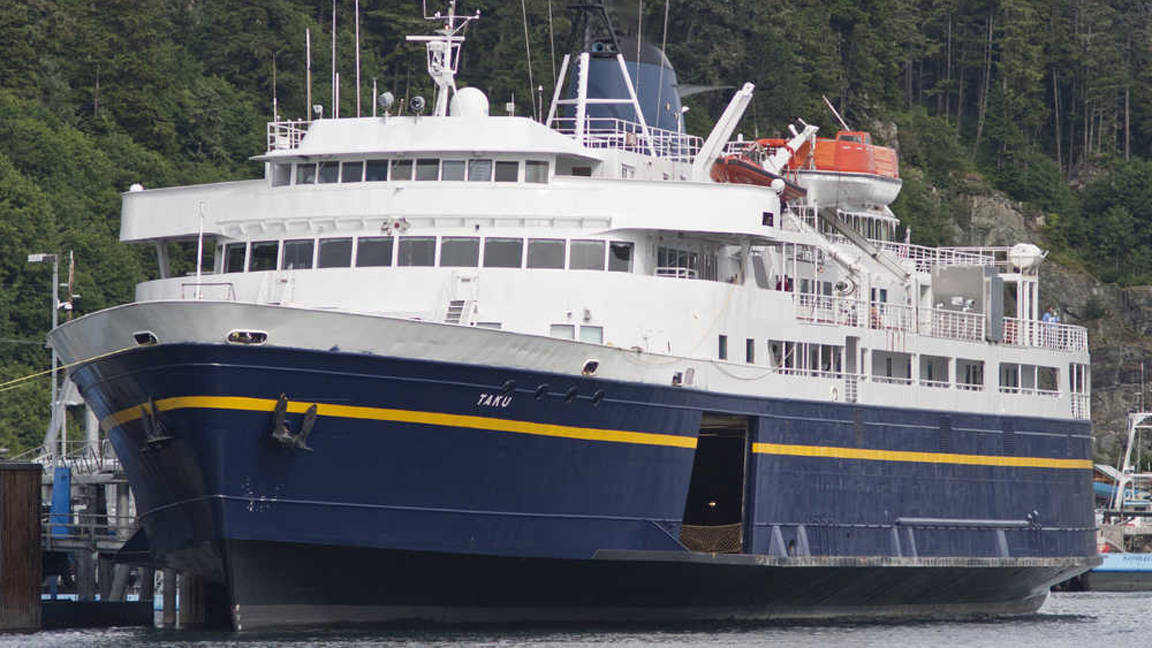The ferry Taku may soon become a Portland hotel.
On Friday, Jonathan Cohen of Portland, Oregon was the high bidder when the Alaska Department of Transportation opened three bidding envelopes for the 352-foot Taku.
Cohen, who represents a group of Portland investors, bid $300,000 — almost six times the amount of the No. 2 bid — and said by phone on Monday that he intends to transform the Taku into a waterfront hotel and restaurant that will occasionally sail into the Columbia and Willamette rivers.
“Our hope is to bring it to Portland, Oregon where we’re based and to use it as a way to give this very historic vessel a second life,” he said.
The No. 2 bid, of $50,400, came from Ben Evans of New Zealand. Evans is a buyer for Jabal Al Lawz Trading Est. of Dubai, which scraps ships in India.
The No. 3 bid, at $50,000, was from Indra Goundar of Vancouver. Subarmani “George” Goundar operates a ferry service in Fiji and said he would operate the Taku alongside the other ships in his four-vessel inter-island ferry operation.
All three bids for the Taku were below the state’s reserve price of $350,000, and state contract officer John Wynne said Friday that the state will now examine the bids to determine which is the best deal for the state.
That decision will be made not just on the bid amount, but on the winning bidder’s ability to move the ship from its Ketchikan berth.
Cohen is one of the figures behind the Society Hotel, a boutique hotel in Portland that opened in a renovated 1880s Chinatown sailors’ hostel two years ago.
In July, Cohen outlined a plan to put a floating hotel at a pier in northwest Portland. According to the application, and as first reported by the Oregonian, the pier would be converted “into a terminal for river-related activities: floating hotel, watersports, seaplane terminal, spa, park, farmers’ market, and/or other amenities beneficial to adjacent condos and apartment buildings.”
Cohen said by phone that the result would be similar to the Queen Mary, an ocean liner converted into a hotel and destination in Long Beach, California.
“We’re not strangers to new and challenging projects. This is a different type of project, and it will come with its own challenges,” he said.
Cohen said the Taku wouldn’t be a high-end hotel; it’d be similar to the Society Hotel, which offers hostel-style accommodations as well as individual rooms.
“We’re not looking to offer high-end hotel rooms. We’re actually looking to make these the least-expensive hotel rooms in town,” he said.
The Taku’s open car deck might be converted into a space for a farmers’ market or small businesses, he said. The lounges could become spaces for “digital nomads” who need working room.
“Everyone has just been so positive about this boat, and I think it just has such a wonderful energy about it, and we want to keep that going,” he said.
Refitting the Taku is likely to be an expensive proposition, something that deterred other bidders. The state extended the bidding deadline four times, and that came after two other offerings received no takers.
According to information provided to bidders, the Taku needs several Coast Guard certifications and some significant maintenance work. Built in 1963, it is showing its age, and the cost of repairs was one of the reasons the ship was taken out of service in 2015.
Goundar, speaking by phone to the Empire in July, said he also had concerns about the way the Alaska Marine Highway System had cannibalized the Taku for parts and equipment used on other ferries. Some of the Taku’s navigation equipment had been removed, state documents indicate, as had much of its lifesaving gear, which will be re-used aboard the new Alaska-class ferries under construction in Ketchikan.
“It’ll take a fortune to renovate the vessel,” he predicted.
Given low scrap prices, the possibility of asbestos aboard, and high transportation costs, Evans said he expects to make a profit of only $100,000 if he buys the Taku for his partnership and scraps it.
The last ferry the state sold, the Bartlett, ended up at Seattle Maritime Academy in Seattle, where it has been used as a school ship. The academy told the Empire earlier this year that it is considering selling the ship because of maintenance costs.
Another cautionary tale comes from the Kalakala, a unique Puget Sound ferry whose Art Deco design resembled a streamlined teardrop. That ferry was brought to Kodiak to serve as a cannery but was recovered and sold back to a Seattle businessman in 1998.
Despite hopes for its restoration, it lingered, deteriorated, and was sold for scrap in 2015.
Cohen is optimistic that won’t happen to the Taku. He said he intends to tow the ship from Ketchikan sometime within the next six months (assuming the state approves the sale), and will begin renovation work afterward.
“Our goal is to be successful with this plan. I feel that Portland is the right place for it now,” he said.
• Contact reporter James Brooks at james.k.brooks@juneauempire.com or call 523-2258.

